




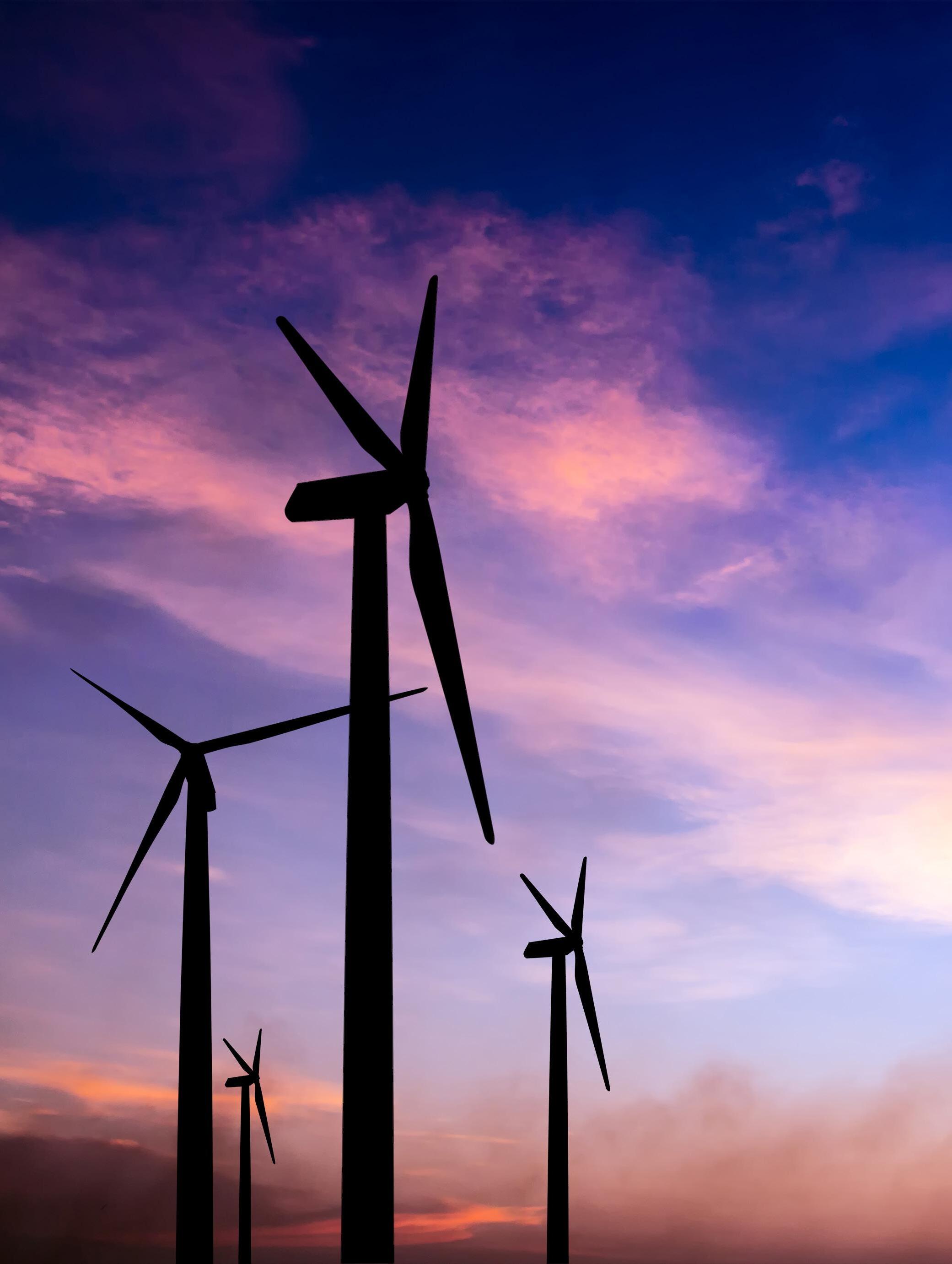
Advancing reliable, affordable, environmentally responsible for Louisiana and the world energy
OUR 2024 WAS QUITE A SUCCESSFUL YEAR for the Louisiana State University Institute for Energy Innovation. As we wrap up our second full year of operation, the Institute has many accomplishments we want to share with you in our second annual report.
The Institute seeks to be a global leader that is driving innovation, developing policy, and training talent for the future of energy—and we have made great strides toward that vision. The first round of research projects on carbon capture and sequestration (CCS) and solar power that were funded at the end of 2023 are now beginning to show meaningful results. We also funded a second round of projects that allowed us to go deeper into CCS and solar and to expand into cutting edge areas like hydrogen, offshore wind, power grid resilience, and biomass.
Our third round of research proposals started during the fourth quarter. We focused on informing the public about our work by starting a monthly newsletter and a series of webinars in July. These communications provide an example for our researchers to discuss their work to ensure that Louisiana is staying at the forefront of energy innovation while limiting environmental impact and maximizing public safety.
The Institute also developed a business plan that will guide its growth and development over the coming years. With the fantastic help of the LSU Foundation, we added Entergy as a financial supporter to our early backing from Shell and ExxonMobil. We also added three new members to the Institute’s staff with an Associate Director for Community Engagement, a Research Coordinator, and an Executive Assistant joining our team.

The support and guidance of our Advisory Board continues to be incredibly important. The Institute wants to be more than a typical think tank by ensuring that our research is useful to the energy industry and can be applied to solve problems and create opportunities. By partnering with industry, government, and academic experts, we can identify promising areas for innovation as well as problems that need to be solved. This approach fits with our goal of advancing LSU’s Scholarship First Agenda while creating a low-carbon energy future for Louisiana that benefits all of its citizens.
Louisiana is at the forefront of the evolution of energy at a critical time in human history. LSU is uniquely positioned to lead the development of new technologies, financing techniques, community engagement methods, and public policies that will ensure all Louisianans thrive in the exciting future we are pursuing together. The LSU Institute for Energy Innovation is proud to be the trusted voice leading this effort.
Thank you for your continued support and engagement. I invite you to explore this report to learn more about our achievements and ongoing initiatives.
Best wishes

BRAD IVES Executive Director, LSU Institute for Energy Innovation

A global leader that drives innovation, develops policy, and trains talent for the future of energy.
To be an independent and trusted voice and a leader in interdisciplinary collaboration that produces groundbreaking research, develops innovative policies, leads demonstration projects, develops educational programs, and engages individuals, communities, governments, and the private sector to create a low-carbon energy future for the benefit of all.


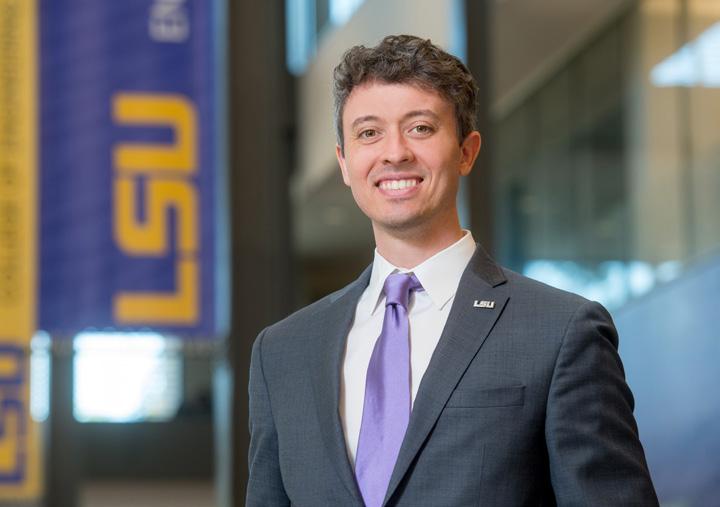

Executive
Associate
Executive Assistant

LOUISIANA PRODUCES
APPROXIMATELY 15 percent of the nation’s oil and 10 percent of its natural gas. It has the second-highest oil refining capacity in the U.S., with the state’s 14 refineries processing approximately 3 million barrels of oil per day. In 2024, Louisiana exported approximately $48 billion in energy products, accounting for 17.9% of the country’s total energy exports.
This makes LSU ground zero for the research, education, and training that is driving global innovation.
The LSU Institute for Energy Innovation continues to advance LSU’s Scholarship First Agenda, which is focused on creating solutions that are essential to Louisiana and the nation.
IN THE 1870s the Louisiana legislature and LSU formalized the University’s commitment to teaching military tactics and agriculture to provide a “liberal, practical education” to working classes. By adhering to those stipulations of the federal Morrill Act, LSU became the state’s first land-grant university.
In the 20th century, LSU gained federal status as both a sea-grant and space-grant university by developing curricula that allow students to contribute to the coastal environment and economy as well as advance the field of aeronautics and space. In 2022, LSU President William F. Tate IV reframed and reinvigorated university priorities through the Scholarship First Agenda to align LSU’s areas of strength with urgent and long-term opportunities to elevate lives within the state and around the world, with student success at the core of this bold vision for impact.
In introducing the concept to the LSU community, Tate explained, “The Scholarship First Agenda is about a commitment to the pursuit of excellence in everything we do. It is about exceptional academic scholarship in the form of research and creative works. It is about carving out financial pathways that allow students of talent to pursue an LSU education without barriers. And it is about using our
intellectual and human capital to create innovative and timely advances in critical areas that better the lives of our friends and neighbors.”
The Scholarship First Agenda seeks to better the lives of citizens throughout the state by providing extraordinary educational opportunities for its students and addressing critical problems through ground-breaking research and discovery. To achieve those goals, the University has identified a pentagon of priorities—agriculture, biomedical, coast, defense and energy.
Energy is Louisiana’s leading industry, which means that lives and livelihoods depend on the state staying competitive by being at the forefront of innovation for the nation to meet increased global demand for lower-carbon energy and chemicals. The LSU Institute for Energy Innovation was launched to coordinate, support, and advance energy research to meet the specific needs of the expanding energy industry and Louisiana communities.
In less than three years, the LSU Institute for Energy Innovation has made significant strides in advancing the Scholarship First Agenda. LSU, supported by the work of the Institute, is preparing students to become leaders with a practical education in next-generation energy technology and preparing the state to optimize the opportunities presented by energy transition.

IVES JOINED THE LSU Institute for Energy Innovation as its first permanent Director in October 2023. He brings a rare combination of experience in the private sector, government and academia. Ives began his career as a finance lawyer on Wall Street where he worked on Louisiana’s only hydroelectric power plant. He later moved to institutional money management and led the founding investment in Braemar Energy Ventures, an early clean technology venture capital fund, and spent four years working in London. After returning to the U.S., Ives developed an award-winning landfill gas project to supply renewable energy to ExxonMobil’s Baton Rouge Polyolefins Plant. He went on to serve as North Carolina’s Assistant Secretary for Natural Resources and as Assistant Vice Chancellor and Chief Sustainability Officer for the University of North Carolina at Chapel Hill.


Ives describes the ongoing energy evolution as the greatest transformation in the history of mankind: “Never has humanity been asked to make such a rapid and revolutionary change,” he says. “LSU is uniquely positioned to develop new technologies, policies and financing methods that will ensure everyone benefits.”
WORKING WITH IVES to guide the Institute and the state’s energy transition are the members of the Institute’s Advisory Board, who represent academia and industry. The Advisory Board meets quarterly to receive updates on the Institute’s research, outreach programs, and other work. Members provide valuable insight on potential areas of research and how the Institute can best respond to the needs of the energy industry and society at large.
GREG BOWSER
Louisiana Chemical Association President and CEO
TOMMY FAUCHEUX
Louisiana Mid-Continent Oil & Gas Association President
SELDA GUNSEL
Chief Technology Officer and Executive Vice President, Technology at Shell
ROY HAGGERTY
LSU Executive Vice President and Provost
KIMBERLY LEWIS
LSU Executive Vice President of Finance and Administration and Chief Administrative Officer
ANDREY SHUVALOV
Vice President, U.S. Energy Transition at Shell
ROB STUART
President and CEO of the LSU Foundation
LEE STOCKWELLL
Shell Energy Resources Company, General Manager of U.S. Carbon Capture and Storage
ROBERT TWILLEY
LSU Vice President for Research and Economic Development
THE LSU INSTITUTE for Energy Innovation continuously engages experts on its Academic Advisory Committee to advance academically rigorous, relevant, cutting-edge work and ensure collaboration across multiple disciplines. The members of the Academic Advisory Committee are appointed by LSU’s Vice President of Research and Economic Development with input from the Institute’s leadership and Advisory Board.
The committee includes faculty representatives from across the LSU System who are experts in diverse disciplines ranging from engineering to social science to education and workforce development. The group provides recommendations for proposed research topics and how to best develop industry-university collaborations led by multidisciplinary teams.
With their guidance, the LSU Institute for Energy Innovation assists in the recruitment of new faculty whose expertise aligns with Institute goals while enhancing the University’s ability to address energy challenges and workforce needs.
The following LSU faculty are members of the Academic Advisory Committee:
ROBERT R. TWILLEY
Vice President, Office of Research & Economic Development
MATTHEW B. BETHEL
Associate Executive Director of Research, Louisiana Sea Grant. College Program; Department of Oceanography and Coastal Sciences
DEBORAH GOLDGABER
Associate Professor & Section Head of Philosophy, Department of Philosophy & Religious Studies; Director, LSU Ethics Institute
NOEMIE ELGRISHI
Associate Professor, Department of Chemistry
CLARE FALCON
Director and State Geologist, Louisiana Geological Survey
JOHN C. FLAKE
Associate Vice President for Research for Natural and Built Environments, Jesse Coates Professor, Jay Affolter Professor, Cain Department of Chemical Engineering
KEITH B. HALL
Nesser Family Chair in Energy Law, Campanile Charities Professor of Energy Law, John P. Laborde Endowed Professorship in Energy Law 3 and 4, Director of the Energy Law Center; Director of the Mineral Law Institute; Professor of Law, Paul M. Hebert Law Center
ROY L. HEIDELBERG
Associate Professor and Department Chair, Department of Public Administration
KORY M. KONSOER
Associate Professor and Graduate Advisor, Department of Geography & Anthropology; Associate Director, LSU Center for River Studies
KANCHAN MAITI
Department Chair and Shell Professor of Oceanography, Department of Oceanography and Coastal Sciences
MARGARET A. REAMS
Joseph D. Martinez Professor, Department of Environmental Sciences; Associate Director for Community Engagement, Institute for Energy Innovation
KEVIN M. MCPEAK
Associate Professor, Cain Department of Chemical Engineering
FRANK NEUBRANDER
Executive Director and Chair, Gordon A. Cain Center for Science, Technology, Engineering, and Mathematics Literacy; Demarcus D. Smith Alumni Professor of Mathematics, Department of Mathematics
MICHAEL PASQUIER
Jaak Seynaeve Professor of Christian Studies, Department of History; Associate Dean, College of Humanities and Social Sciences
JYOTSNA SHARMA
Associate Professor, Craft & Hawkins Department of Petroleum Engineering
BRIAN F. SNYDER
Associate Professor, Department of Environmental Sciences
KARSTEN E. THOMPSON
Malcolm C. Jr. and Gene Perdue Lowe Professor, Craft & Hawkins Department of Petroleum Engineering and Cain Department of Chemical Engineering
TRACEY E. RIZZUTO
Mary Ethel Baxter Lipscomb
Memorial Endowed Professor of Human Resource, Leadership, & Organization Development, School of Leadership & Human Resource Development
GREGORY B. UPTON
Executive Director & Associate Research Professor, Center for Energy Studies
QINGLIN WU
Cain Chair and Roy O. Martin Sr. Professor, School of Renewable Natural Resources
Z. GEORGE XUE
Associate Professor, Department of Oceanography and Coastal Sciences & Center for Computation and Technology
SINCE ITS FOUNDING in 2022, the LSU Institute for Energy Innovation has made an undeniable impact as an on-campus engine of energyrelated research, community engagement and economic investment.
• Shell USA, Inc., invests $27.5 million in LSU to establish the Institute for Energy Innovation and jumpstart a new campus district focused on scientific discovery. It is LSU’s largest gift from a for-profit corporate partner and largest philanthropic investment in energyrelated initiatives.
• Rhoman Hardy, a retired senior vice president for Shell US Gulf Coast Chemicals and Products, becomes interim director of the LSU Institute for Energy Innovation and leads development of the organizational structure, goals, and priorities of the new institute.
• The Institute is part of a team of universities, community and technical colleges, agencies, and industry named a finalist for one of five $160 million National Science Foundation (NSF) Engines grant.
• More than 110 students joined the Institute for the Future of Energy Panel discussion with leaders of major energy companies to learn what the future of the industry looks like and how they can be part of it.
• Louisiana Board of Regents officially approves formation of the Institute and the Institute advisory board assembles for its first meeting.
• Exxon Mobil Corporation and ExxonMobil Foundation invest $2 million in LSU to collaboratively pursue key priorities set forth in LSU’s Scholarship First Agenda, including by advancing energy security and sustainability initiatives, and to invest in local community workforce programs and athletics.
• At the Institute’s first industryLSU energy innovation workshop, Shell, Air Products, BASF, Drax, Entergy, ExxonMobil, Louisiana Chemical Association, and Louisiana MidContinent Oil & Gas Association representatives and 60 faculty discuss potential request for proposal (RFP) ideas for research funding.
• LSU secures a $5 million investment in scholarships from the State of Louisiana for energy transition research, supporting LSU’s efforts toward developing global, sustainable energy solutions and promotes the Institute’s growth and other energy-related programs at LSU.
• Phase I RFP yields 13 submissions from 30 faculty representing 14 departments and seven colleges.
• Brad Ives becomes the director of LSU Institute for Energy Innovation.
• LSU Institute for Energy Innovation selects the recipients of the Phase I research grant funding. The projects cover a range of energy challenges from environmental justice to CCUS and solar deployment.
• The inaugural Energy Transition Research Symposium brings together energy researchers from across Louisiana and across disciplines.
• An LSU-led consortium that includes the Institute for Energy Innovation—Gulf Louisiana Offshore Wind (GLOW) Propeller— becomes one of only 31 newly designated U.S. Economic Development Administration Tech Hubs positioned to revitalize American manufacturing, create jobs, and strengthen U.S. economic and national security within a decade.
• A statewide effort led by LSU with more than 50 public and private partners wins the largest and most competitive grant ever awarded by the U.S. National Science Foundation—up to $160 million over the next 10 years. The winning team is called Future Use of Energy in Louisiana (FUEL) and the NSF Engines grant will support Louisiana’s energy industry, create jobs in the energy sector, develop innovative solutions to energy challenges, and help train the world’s energy workforce.
• Entergy makes a financial commitment to the Institute.
• The Institute conducts an Industry-LSU Energy Innovation Workshop for Round II Research RFP.
• U.S. Department of Energy Under Secretary Dr. Geri Richmond visits LSU.
• A faculty symposium is presented in conjunction with Southern University.

• A 60-person stakeholder group of industry collaborators, leading faculty, and students discusses pressing issues related to CCUS, solar deployment, and environmental justice.
• The Institute issues an RFP for Round II of its research grant funding.
• The department’s first newsletter is launched.
• Frank Tsai hosts the first in a series of monthly webinars.
• Round II research awards are announced.
• A special event features Scholar in Residence Andrew Jones of Climate Interactive, Developer of MIT Climate Model.
• Ives and Reams visit Oak Ridge National Laboratory with a team from LSU ORED to discuss potential partnerships.
• The Institute receives a grant from the U.S. Economic Development Administration, $500,000 for the Gulf Louisiana Offshore Wind Program.
• The Institute and the LSU Center for Energy Studies co-host the U.S. Association for Energy Economics conference.
• The Institute leads a panel discussion with ExxonMobil on the PERTT Lab Well Spudding.
• The Institute conducts IndustryLSU Energy Innovation Workshop for Round III Research RFP.
• The Institute hosts Idaho National Lab for a campus visit along with a team from ORED to discuss a potential nuclear research partnership and facility on campus.
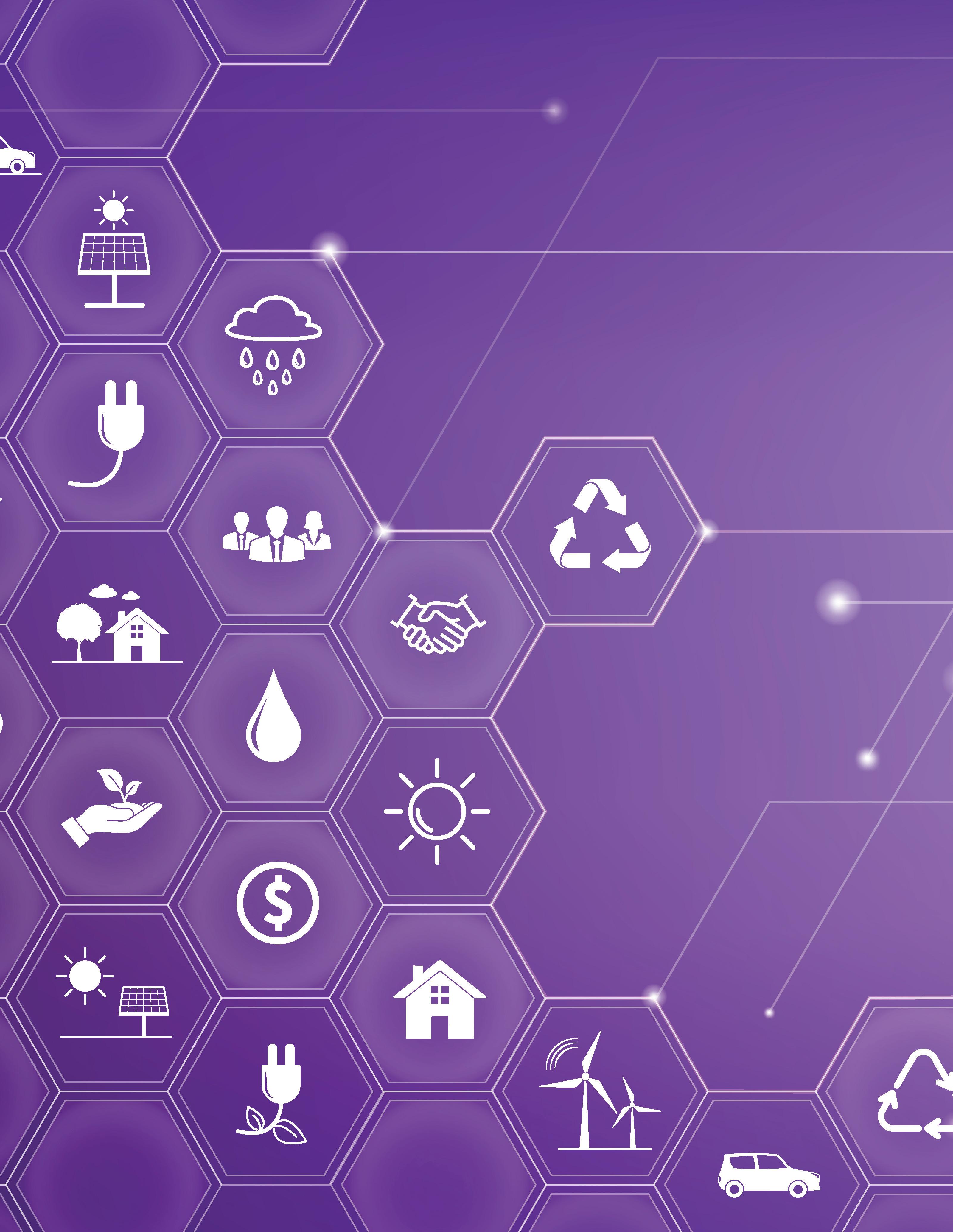
IN JUST TWO years, the LSU Institute for Energy Innovation has become a powerful catalyst for fostering meaningful collaboration between LSU and global energy leaders. By aligning investment opportunities with the priorities of individual and corporate partners, the Institute strategically directs funding to advance its six key areas of research focus.
Shell USA’s $27.5 million investment in 2022, including $25 million dedicated to establishing the Institute, was a transformative step in elevating LSU’s energy research capabilities. This partnership is empowering LSU to pioneer innovative solutions that address the nation’s energy challenges and opportunities.
The momentum continues to build, with likeminded partners—including industry leaders ExxonMobil and Entergy—joining LSU and Shell as investors in this vital mission. Their contributions have positioned the Institute to competitively fund research across multiple disciplines, supporting LSU faculty in delivering high-impact outcomes.
Energy innovation remains central to LSU’s Scholarship First Agenda, and the Institute’s robust pipeline of faculty research proposals reflects the immense potential of these efforts. Philanthropy has had and will have a crucial role in the trajectory of this progress, funding discoveries today that will shape the energy solutions of tomorrow.
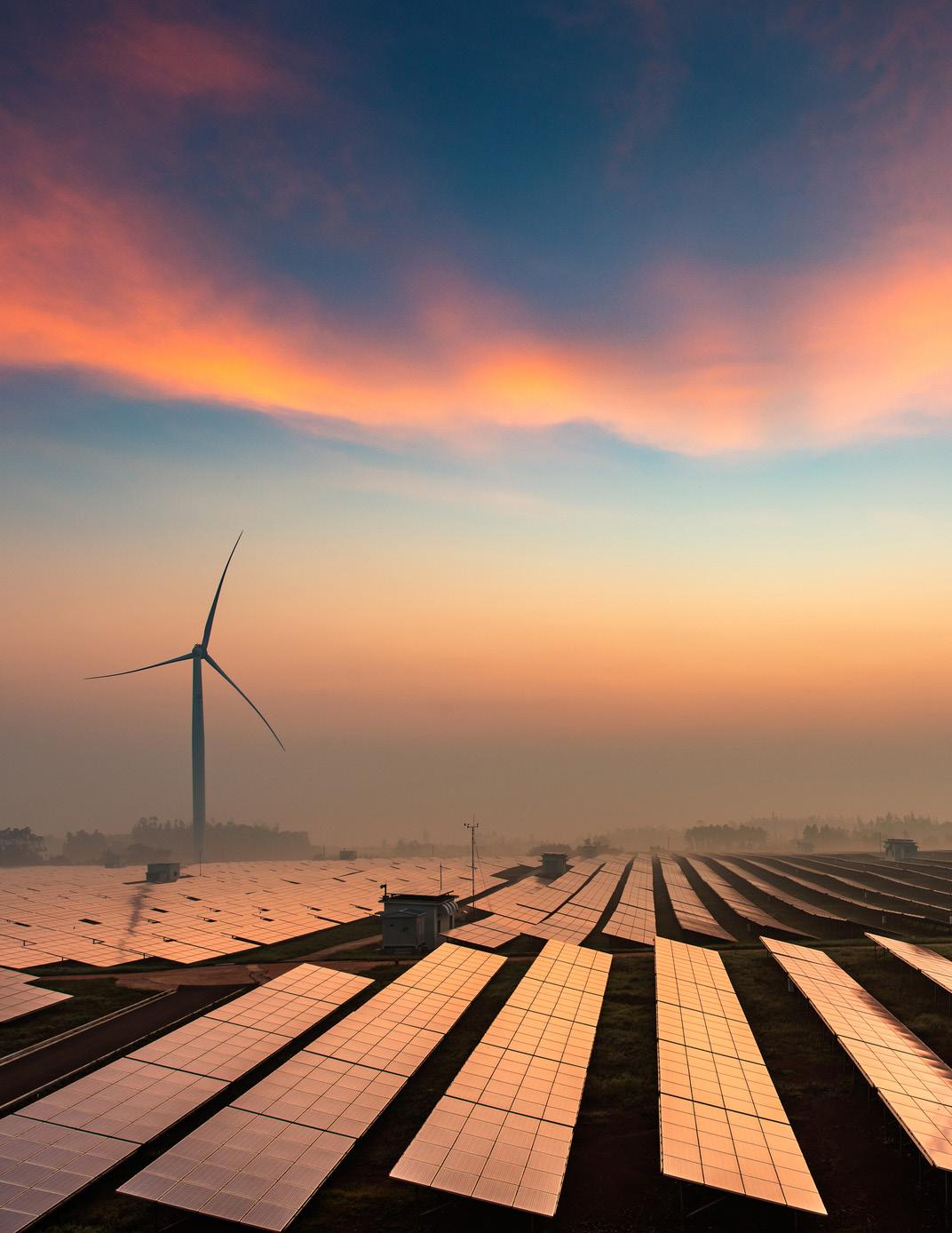
Momentum continues to build in the energy innovation space

currently account for more than 20 percent of the total economic output in Louisiana and employ nearly 10 percent of the state’s workforce, according to the U.S. Bureau of Economic Analysis. It’s critical, therefore, that the LSU Institute for Energy Innovation stays intimately connected and in lockstep with the future needs of Louisiana’s energy industry.
The Institute seeks to bridge academia and the private sector by proactively and collectively tackling challenges in the energy innovation arena by supporting practical and applicable research. We recognize that it is important that jobs be maintained and the economy sustained as the market evolves.
In the coming years, a new entrant in the innovation space—the fledgling AI data center market—will undoubtedly be impactful in terms of job creation. In
December, Meta, the parent company of Facebook and Instagram, announced that it would build a $10 billion AI data center in Richland Parish. Shortly thereafter, Hut 8, a bitcoin miner headquartered in Miami, announced plans to build a similarly massive AI data center in West Feliciana Parish, and officials have hinted that more announcements are on the horizon. (Source: Baton Rouge Business Report)
Land availability, energy capacity and workforce readiness—propped up by a robust community and technical college system—will be key to driving data center investment in the state. In fact, Louisiana could become a lab of sorts for AI applications, given its expertise in agriculture, defense and water management. (Source: Baton Rouge Business Report)
The rapid growth of AI will undoubtedly have significant impacts on electricity demand. Over the last two years, new and expanded data centers have emerged as significant sources of electricity sales
growth in the U.S. In a recent report, the Electric Power Research Institute (EPRI) estimates that data center electricity consumption could grow by some 252 TWh (terawatt hours) by 2030, equivalent to 5.9 percent of U.S. electric sales in 2023. That is a stunning projection.
Locally, Entergy forecasts that its five regulated utilities could see total electricity sales grow by 30 TWh through 2028, led primarily by industrial sales growth of 8 to 9 percent annually. Similarly, American Electric Power (AEP), which serves portions of northwest Louisiana, forecasts 15 GW of company-wide incremental load growth led by strong data center demand along with approximately $43 billion in capital investment planned for 2024-28; and Cleco Power has touted electricity sales growth opportunities tied to its electrification and decarbonization efforts. (Source: Gulf Coast Energy Outlook 2025)
In tandem with expected increases in demand, power providers also are intensifying their focus on renewables and are
As the energy economy expands, the Institute for Energy Innovation seeks to further catalyze that growth by supporting Louisiana’s industry as it develops new revenue streams. Ultimately, the Institute serves as a connecting point between industry and academia in the pursuit of useful and collaborative research that can be directly applied to real-world energy challenges.
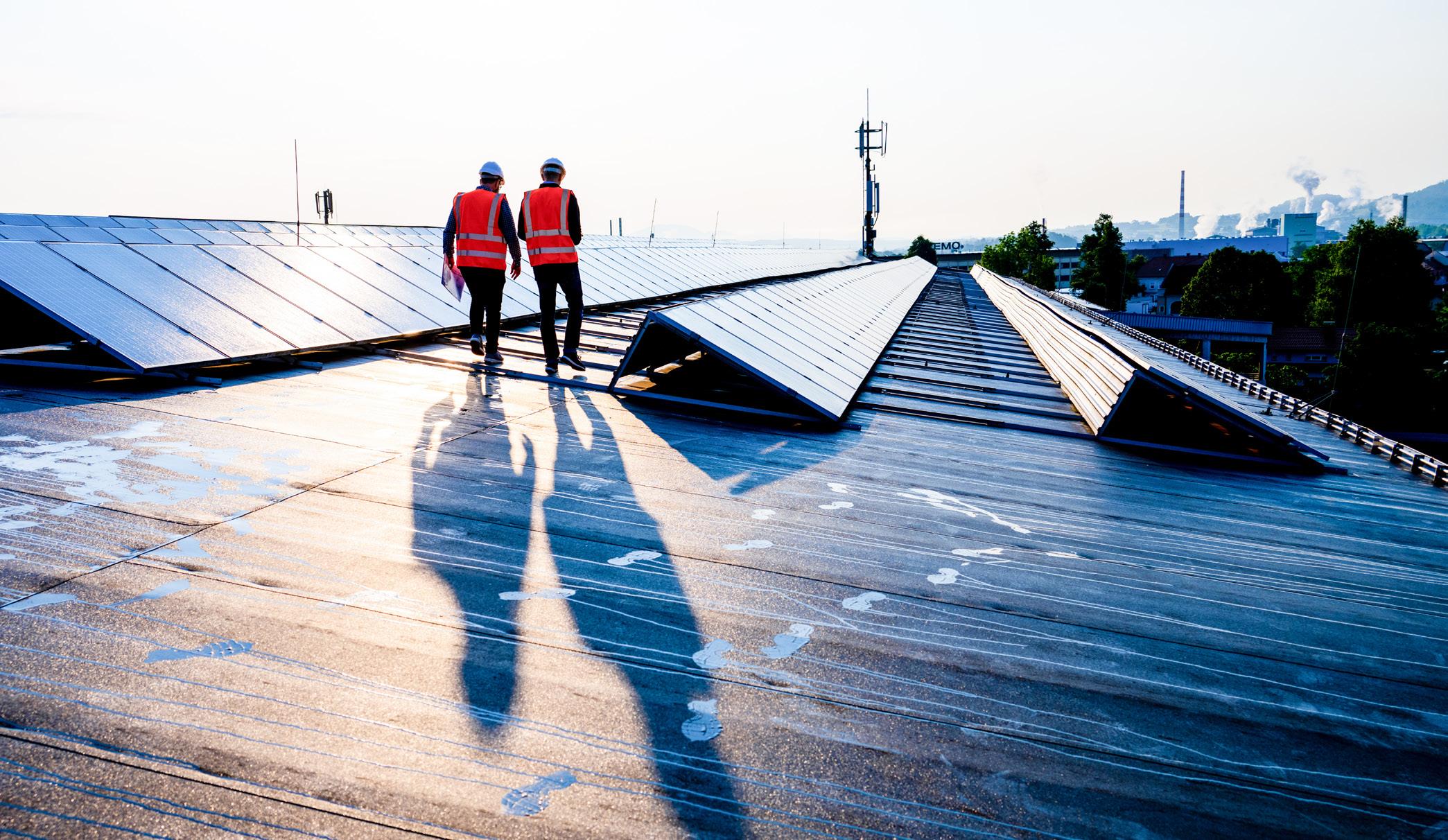
beginning to pursue nuclear power. In 2024, Google partnered with Kairos Power in Alameda, Calif., to deploy a U.S. fleet of advanced nuclear power projects by 2035 (Source: www.kairospower.com); Amazon invested in the development of small modular nuclear reactors with X-energy (Source: www.x-energy.com); and Meta issued an RFP for nuclear power. (Source: www.sustainability.atmeta.com)
Decarbonization will continue to be a major focus of most industrial investment in the Gulf Coast region. During his second term, former Louisiana Governor John Bel Edwards committed Louisiana to greenhouse gas emission reduction targets of 25 to 28 percent in 2025 and complete carbon neutrality by 2050.
Under Louisiana’s new governor, Jeff Landry, Louisiana Economic Development (LED) and the Department of Energy & Natural Resources (DENR) have acknowledged that industrial customers and investors expect emissions to be competitively low. The intensification of industrial decarbonization efforts will no doubt also be influenced for several years by the federal Inflation Reduction Act—signed into law August 2022—which provides a decade
of funding for technologies and projects intended to facilitate emissions reductions. Additionally, decarbonization provides an opportunity for regional leadership in the development and production of liquid fuels, chemicals, plastics, fertilizers and other products with lower greenhouse gas emissions. As a result, decarbonization is expected to create considerable regional capital investment opportunities throughout Louisiana and the Gulf Coast region for the foreseeable future. (Source: Gulf Coast Energy Outlook 2025)
Natural gas prices are disproportionately low in the U.S. in comparison with most other countries, particularly those in Europe. The cheap fuel has, in turn, led to an unprecedented industrial boom in Louisiana and Texas that is showing no signs of slowing. There are presently $34.4 billion in projects under construction in the New Orleans, Baton Rouge and Lake Charles areas, and another $115.7 million that have been announced but not issued a Final Investment Decision. (Source: Louisiana Economic Forecast, 2025-26)
Additionally, by 2030 the entire Gulf Coast region could see as much as $219 billion in LNG investment, $151 billion in chemical and refining and other traditional industry investments, and $107 billion in energy transition investments. (Source: Gulf Coast Energy Outlook 2025)
Of that, energy transition investments continue to represent one of the fastest
growing sectors of the energy economy. There are currently a record $25 billion in announcements for the Gulf Coast region in 2025 and $23 billion in 2026. The overwhelming bulk of these investments are in clean hydrogen and ammonia projects that could add an additional $51 billion in capital investment from 2025 through 2030 if completed. Another $19 billion in “other” transition investments focus on battery energy storage manufacturing, various types of biofuels and other clean synthetic fuels, among other smaller clean energy investments. (Source: Gulf Coast Energy Outlook 2025)
Lastly, CCS (Carbon Capture & Storage) project announcements including underground carbon storage and direct air capture (DAC) projects—will total an estimated $7 billion from 2025 through 2030. CCS investments have captured considerable attention in the Gulf Coast region over the past several years, particularly with the recent U.S. EPA primacy grant to Louisiana. As a result, Louisiana will be able to assess and permit wells and storage facilities dedicated to carbon capture going forward.
The region has seen considerable activity in CCS investments over the past several years. Since 2023, there is as much as 121 million metric tons per year of storage capacity in announced CCS projects in Texas, with Louisiana following closely behind with nearly 88 Mtpa in projects. Elsewhere, Mississippi and Alabama have, collectively, about 14 Mtpa of projects. (Source: Gulf Coast Energy Outlook 2025)

THE INSTITUTE FOR ENERGY INNOVATION seeks to collaboratively solve the challenges of energy transformation by bringing together academics and stakeholders in a cooperative atmosphere to match areas of need with applicable research.
This Institute-led approach is already reaping substantive, practical results. Research projects funded in Fall 2023 have made significant progress, and in Fall 2024 the Institute presented more than $2.6 million in additional funding—its second round of awards—to eight more research initiatives across the energy innovation space.
Following are brief descriptions of the projects funded during this most recent second round:

(Sector: Offshore Wind; Award: $498,188 for two years)
Dr. Chao Sun in the Department of Civil and Environmental Engineering will develop computational tools and datasets for the resilient design, planning and operation of offshore wind farms in the Gulf of Mexico. With the help of Dr. Paul Miller in the Department of Oceanography & Coastal Sciences and Dr. Celalettin Ozdemir in the Department of Civil & Environmental Engineering, Sun will address challenges posed by extreme wind and wave conditions during hurricanes.
(Sector: CCUs & Hydrogen; Award: $149,964 for one year)
Dr. Frank Tsai in the Department of Civil & Environmental Engineering will develop an AI-driven digital well log database to support carbon capture and sequestration and hydrogen storage solutions. Tsai will focus on digitizing and interpreting more than 7,000 well logs, leveraging AI to enhance the efficiency and accuracy of geological assessments crucial for sustainable energy storage. Assisting will be Dr. Christopher Kees in the Department of Civil & Environmental Engineering, Dr. Yi-Jun Xu in the Department of Oceanography & Coastal Sciences and Dr. Ahmed Abdalla in the Department of Petroleum Engineering.

(Sector: Biofuels; Award: $149,941 for one year)
Dr. Anurag Mandalika in the LSU Center for Energy Studies and collaborators Dr. Kerry Dooley in the Department of Chemical Engineering and Dr. Brian Snyder in the Department of Environmental Sciences will evaluate the potential for biocrude as a sustainable aviation and maritime fuel derived from biomass residues. In the process, they will develop and test innovative processes for converting biomass into biocrude.
(Sector: CCUS; Award: $600,000 for two years)
Dr. William M. Moe in the Department of Civil & Environmental Engineering will address the environmental impacts associated with amine-based carbon capture systems. Moe will develop biological, photochemical and catalytic processes to treat amine-rich wastewater, optimize the destruction of nitrosamines and mitigate emissions from carbon capture operations. Assisting will be Dr. Kevin McPeak in the Department of Chemical Engineering and Dr. Samuel D. Snow in the Department of Civil & Environmental Engineering, along with industry partners Shell, ExxonMobil, WSP USA Inc. and the Louisiana Department of Health.
(Sector: Hydrogen; Award: $149,499 for one year)
Dr. Mehdi Zeidouni in the Department of Petroleum Engineering and Dr. Vahid Atashbari with the Southern University PTEC Program will establish practical criteria for selecting sites for underground hydrogen storage in Louisiana, focusing on the evaluation of geological formations. They will analyze geological and production data with the help of the Louisiana Department of Energy and Natural Resources, ExxonMobil, FlowTex Energy and Southern States Energy Board to identify and validate potential storage locations.
(Sector: Solar; Award: $410,320 for two years)
Dr. Aly Mousaad Aly in the Department of Civil & Environmental Engineering will advance the development and deployment of wind- and hail-resilient, cost-effective and equitable community-scale agrivoltaic systems. Aly will utilize large-scale wind tunnel testing, computational modeling and stakeholder engagement to address the technical, economic and social challenges associated with integrating renewable energy generation and agricultural practices. Assisting will be Solar Alternatives, the Gulf States Renewable Energy Industries Association and the Louisiana Department of Energy & Natural Resources.
(Sector: Power Grid Resilience & Environmental Justice; Award: $600,000 for two years)
Dr. Amin Kargarian in the Department of Electrical & Computer Engineering, will develop equitable resilience strategies for power grids in disaster-prone areas, with a focus on vulnerable populations. Assisted by Dr. Celalettin Ozdemir in the Department of Civil & Environmental Engineering and Dr. Mehdi Farasat in the Department of Electrical & Computer Engineering, Kargarian will develop and test a community-based model on the New Orleans distribution grid that integrates coordinated resilience planning and energy management approaches to ensure the fair distribution of energy resources.
(Sector: Carbon Offsets; Award: $99,978 for one year)
Dr. Andrew Schwarz in the Department of Entrepreneurship & Information Systems, in collaboration with Dr. George Xue in the Department of Oceanography & Coastal Sciences, will explore the commercial viability of using numerical models as monitoring, reporting and verification tools for natural-based carbon sequestration, focusing on marine carbon dioxide removal. They’ll assess and develop models that can measure and verify the impacts of such projects, providing a reliable basis for carbon trading markets.
Assessing Carbon Geological Storage Impacts on Louisiana’s Water Resources and Environment
(Sector: Carbon Capture and Sequestration; Award: $489,848)
Department of Civil and Environmental Engineering Professor Frank Tsai is studying the potential impact of carbon storage in Louisiana’s porous rocks on drinking water, water supplies and the environment. Tsai, who is the director of the Louisiana Water Resources Research Institute, is working with a research team to uncover any hidden dangers.

Experimental Analysis of Floating Photovoltaic Systems in Industrial Wastewater Treatment Ponds for Louisiana Community Resiliency
(Sector: Solar & Environmental Justice; Award: $500,000 for two years)
Louisiana Sea Grant and LSU AgCenter water quality specialist M.P. Hayes is examining the use of temporary, deployable floating photovoltaic systems in non-economic water bodies—such as wastewater treatment ponds and irrigation ponds—to generate renewable energy in disadvantaged communities. The project is in collaboration with Chao Wang with the College of Engineering and Professor Greg Upton with the Center for Energy Studies.
and Field
Demonstration of Distributed Fiber-Optic Carbon Sensor for Long-Term Monitoring of Storage Sites
(Sector: Carbon Capture and Sequestration; Award: $500,000)
Craft & Hawkins Department of Petroleum Engineering Assistant Professor Jyotsna Sharma is leading a team including Mechanical Engineering Associate Professor Manas Gartia and collaborators at the National Energy Technology Laboratory (NETL) to develop a distributed fiber-optic sensor to monitor carbon leaks and structural integrity in carbon capture and sequestration sites and carbon pipelines.
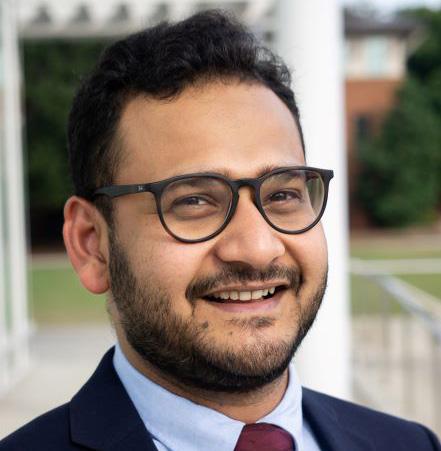
Utilizing the Sun for a Sustainable Future
(Sector: Solar; Award: $94,000)
Bert S. Turner Department of Construction Management
Assistant Professor Arup Bhattacharya is researching solar power farming in the state. The project will evaluate multiple factors associated with designing, installing and demonstrating solar farms in urban, open or unused spaces. The project team, consisting of a broad range of expertise and partnered with BASF, proposes to examine the variables associated with site selection, land reuse, occupant behavior, energy demand, and weatherdependent energy production through a holistic approach.
These are exciting times, as the Institute makes significant strides toward its primary mission: to develop solutions for complex technical, economic, social and environmental challenges to advance energy innovation.
(Sector: Solar & Environmental Justice; Award: $94,000)
The research project, led by Anmol Soni, is examining trends in academic literature, and the legislative and policy framework in the utility scale solar policy subsystem, to identify areas where the state and the legislature of Louisiana can support the sector. (Co-PIs are Holly Peterson and Aaron Bivins.) Phase I funding for synthesis and experimental research stimulates the development of interdisciplinary teams to help solve critical energy transition challenges for Louisiana industry, government, and communities.
(Sector: Carbon Capture and Sequestration; Award: $86,641)
An interdisciplinary team from the Department of Environmental Sciences is helping to ensure the success of carbon capture and sequestration projects by using AI to help select safe, stable sites for the captured carbon to be injected and stored. Professor Supratik Mukhopadhyay, along with Assistant Professor Thomas Douthat, are building an AI system that will generate a “heat map” of potential locations around the state, based on a variety of factors. The map will be available to industry, government and the public.
Twins for Agrivoltaic and Floating Solar Farms to Support Design Exploration, Deployment, and Optimization
(Sector: Solar; Award: $500,000)
The project, led by Christopher Kees, is developing multiscale, multi-resolution simulators for land- and water-based, commercial-scale solar installations. (Co-PIs are Fabiana Trinidade da Silva and Brett Wolfe.) The simulators are based upon physics-based modeling of the solar infrastructure and the surrounding environment, specifically, wind, water, vegetation, and soil interactions. A multi-scale approach is being used to provide model predictions at both the scale of individual panels and full-scale commercial installations.
(Sector: Carbon Capture and Sequestration; Award: $98,000)
LSU Law Professor Keith Hall is studying methods for compensating landowners, as well as state and local governments, for carbon capture and storage. The study involves an interdisciplinary team of LSU professors from across campus, as well as a graduate student studying economics. Hall will lead the study, assisted by Professor Greg Upton, executive director of the Center for Energy Studies; Professor Joanna Walker of the Center for Energy Studies; and Professor Daniel Keniston, who serves as director of graduate studies in the Department of Economics at the E.J. Ourso College of Business.
(Sector: Solar; Award: $100,000)
Professor Aly Mousaad Aly is researching the potential impact of extreme wind events on solar power installations, and in the process hopes to improve their design and durability. LSU’s Windstorm Impact, Science, and Engineering (WISE) Open-Jet Testing facility is playing a vital role in Aly’s research, as it will provide a realistic representation of hurricane-strength wind conditions through large-scale turbulent generation, enabling comprehensive testing of the panels.
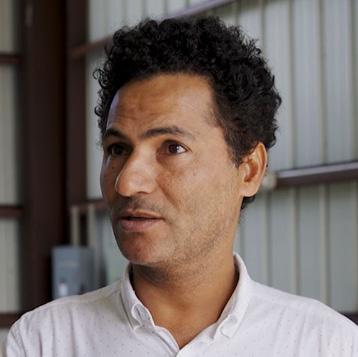
(Sector: Carbon Capture and Sequestration; Award: $252,160)
Craft & Hawkins Department of Petroleum Engineering
Associate Professor Mehdi Zeidouni is tracking subsurface CO2 flow and well-sealing capacity in Geological Carbon Storage (GCS) projects. Zeidouni’s project aims to improve the effectiveness of pressure and temperature data in monitoring GCS projects at various phases. Pressure and temperature data at injection/observation wells can be acquired at low cost along the entire length of wellbores to determine the fate of injected CO2 in the subsurface.
The Institute fosters collaboration and mutual learning through its many workshops, seminars, speakers’ series, webinars, and special events.
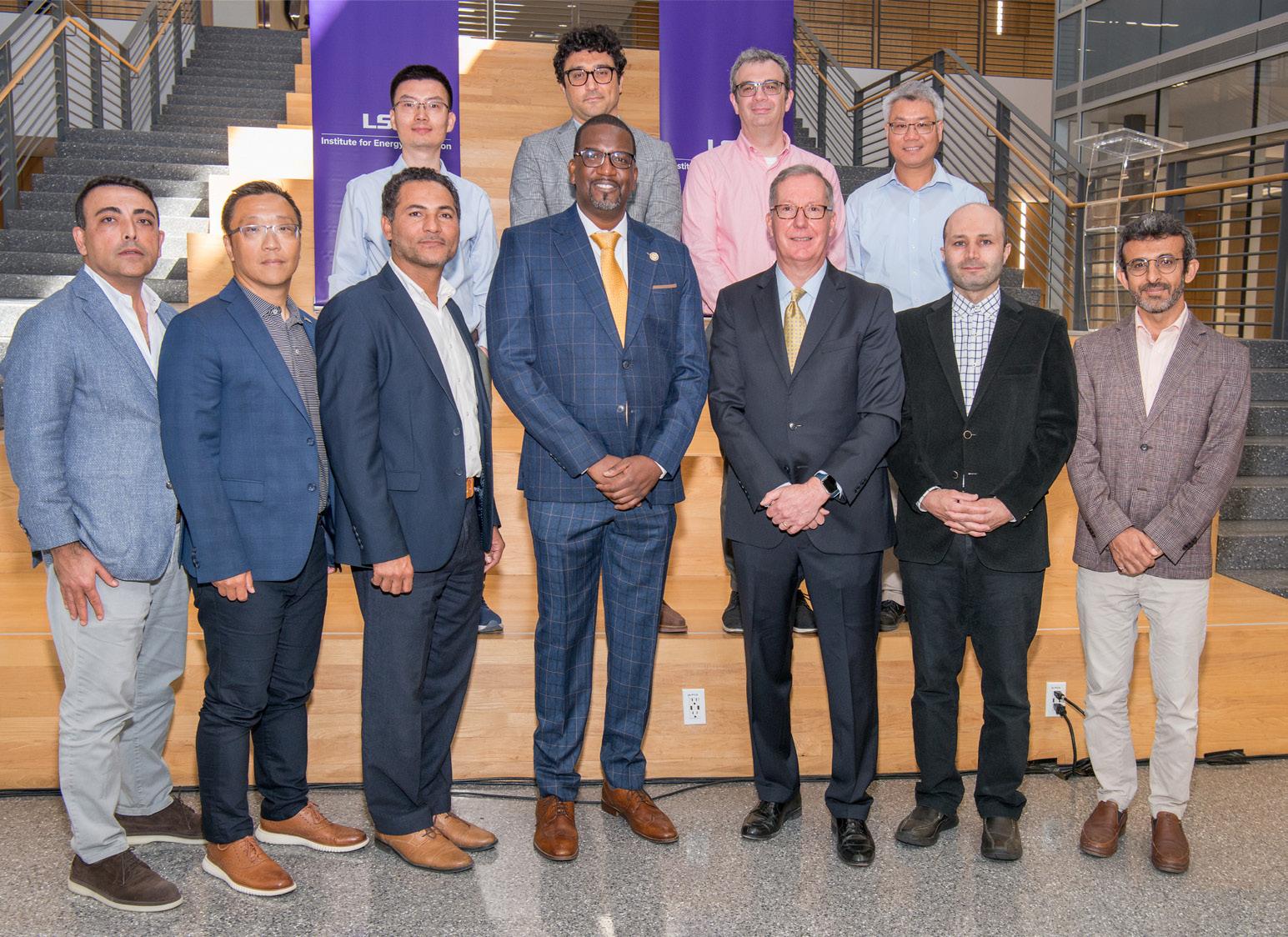
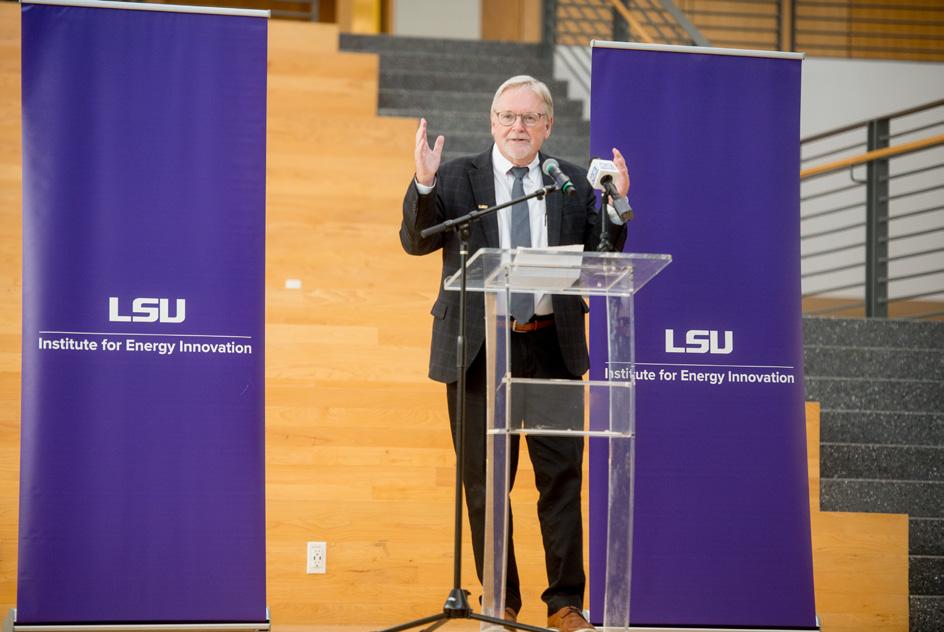
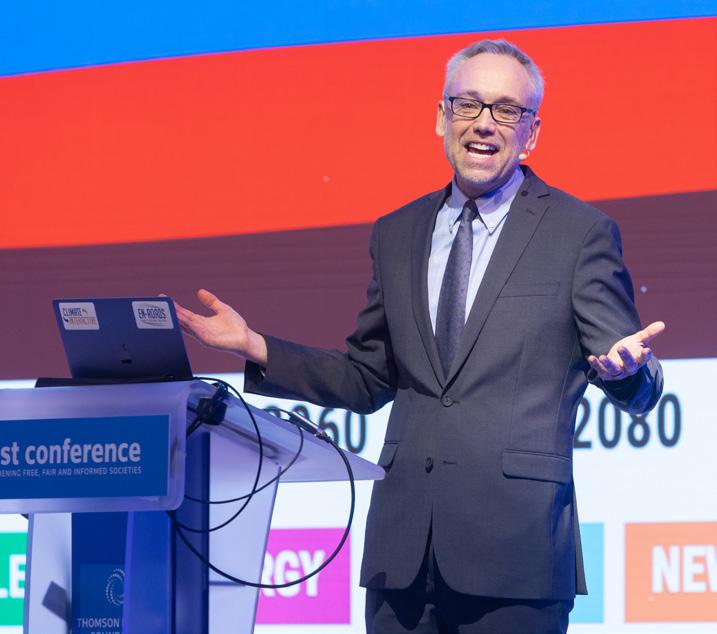
Andrew Jones, Executive Director and Co-Founder of Climate Interactive, visited LSU to discuss the EnROADS Simulator.


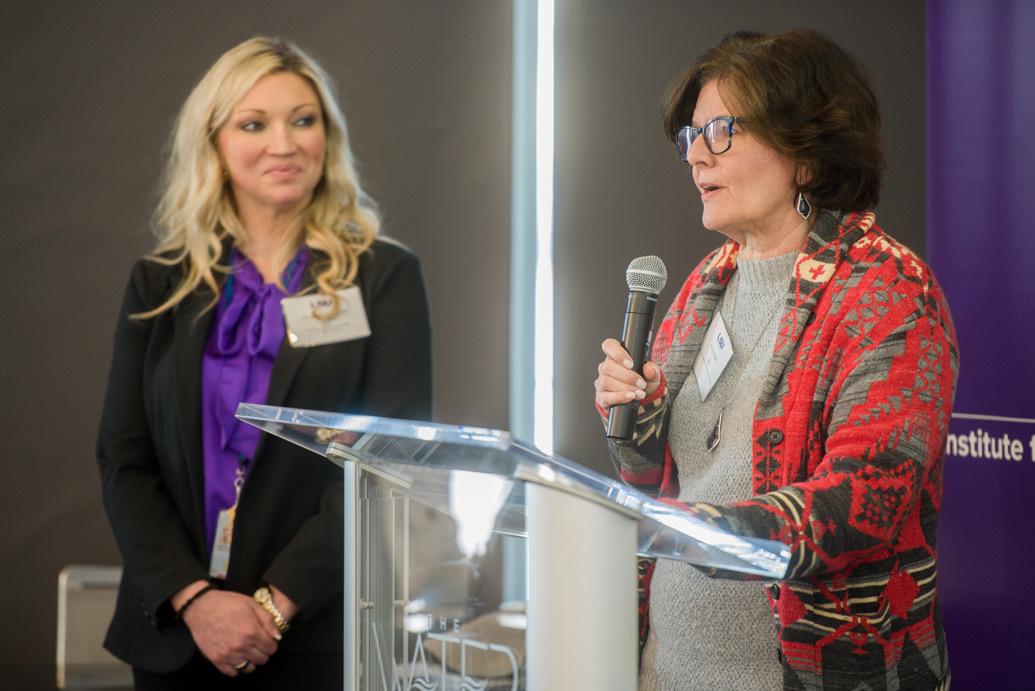
Speakers and attendees networked and shared ideas at the Industry-LSU Energy Innovation workshop, which was held in November.
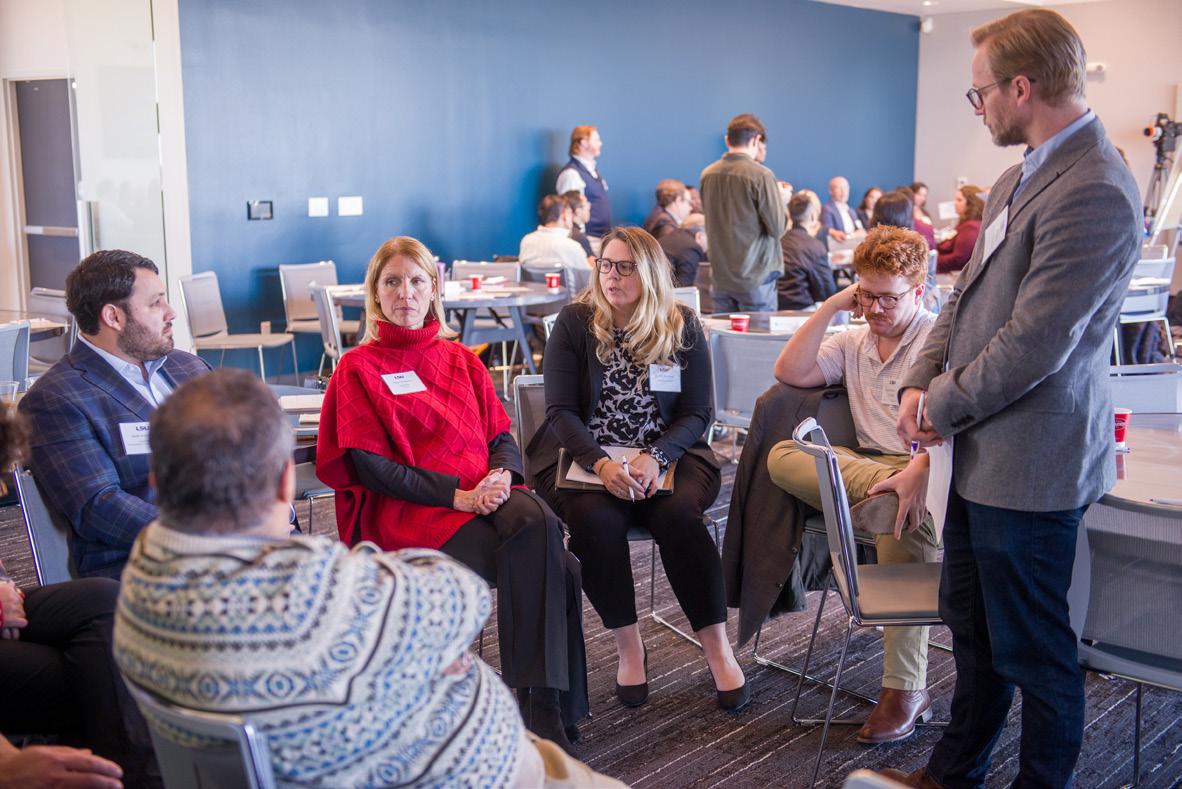
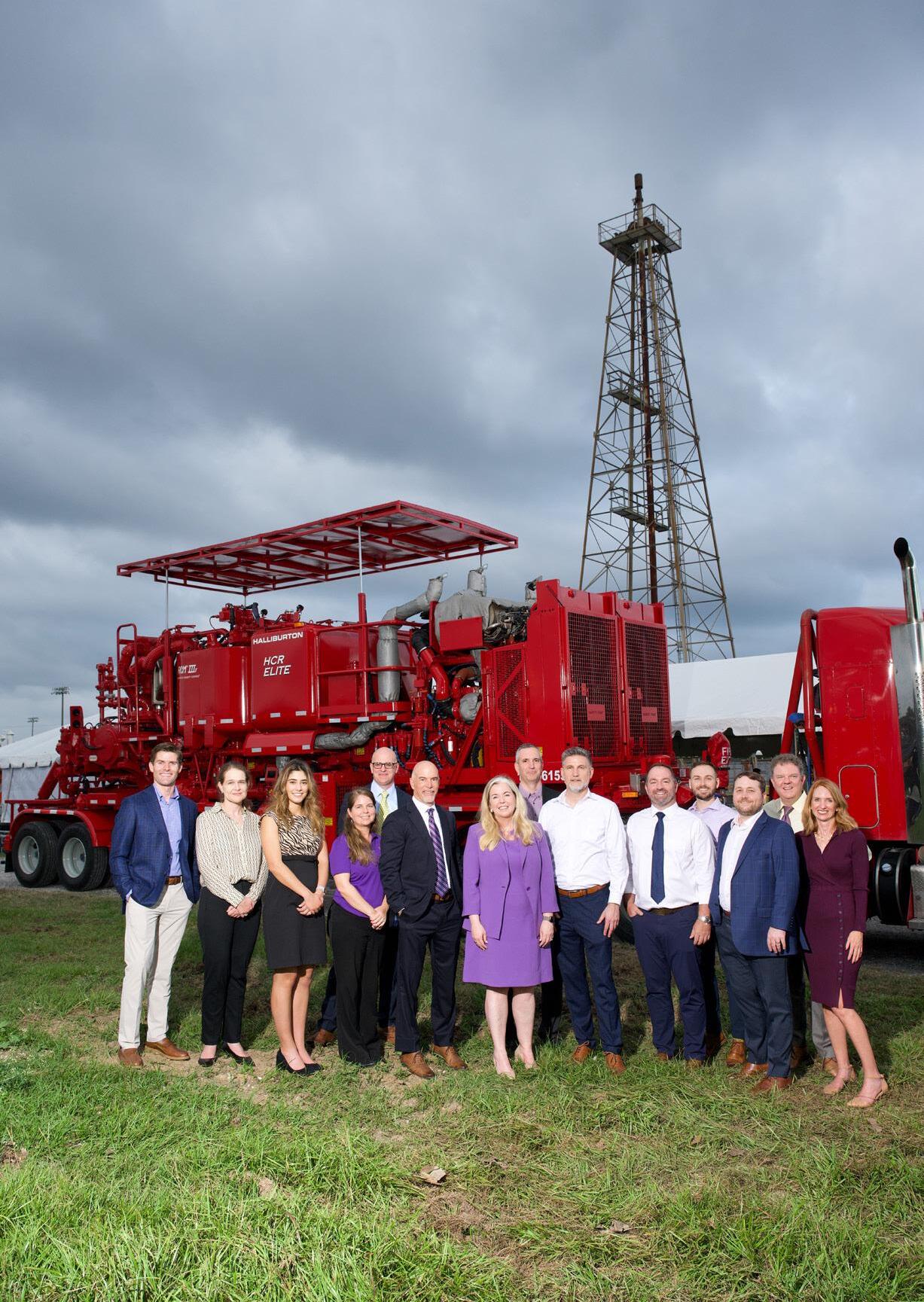
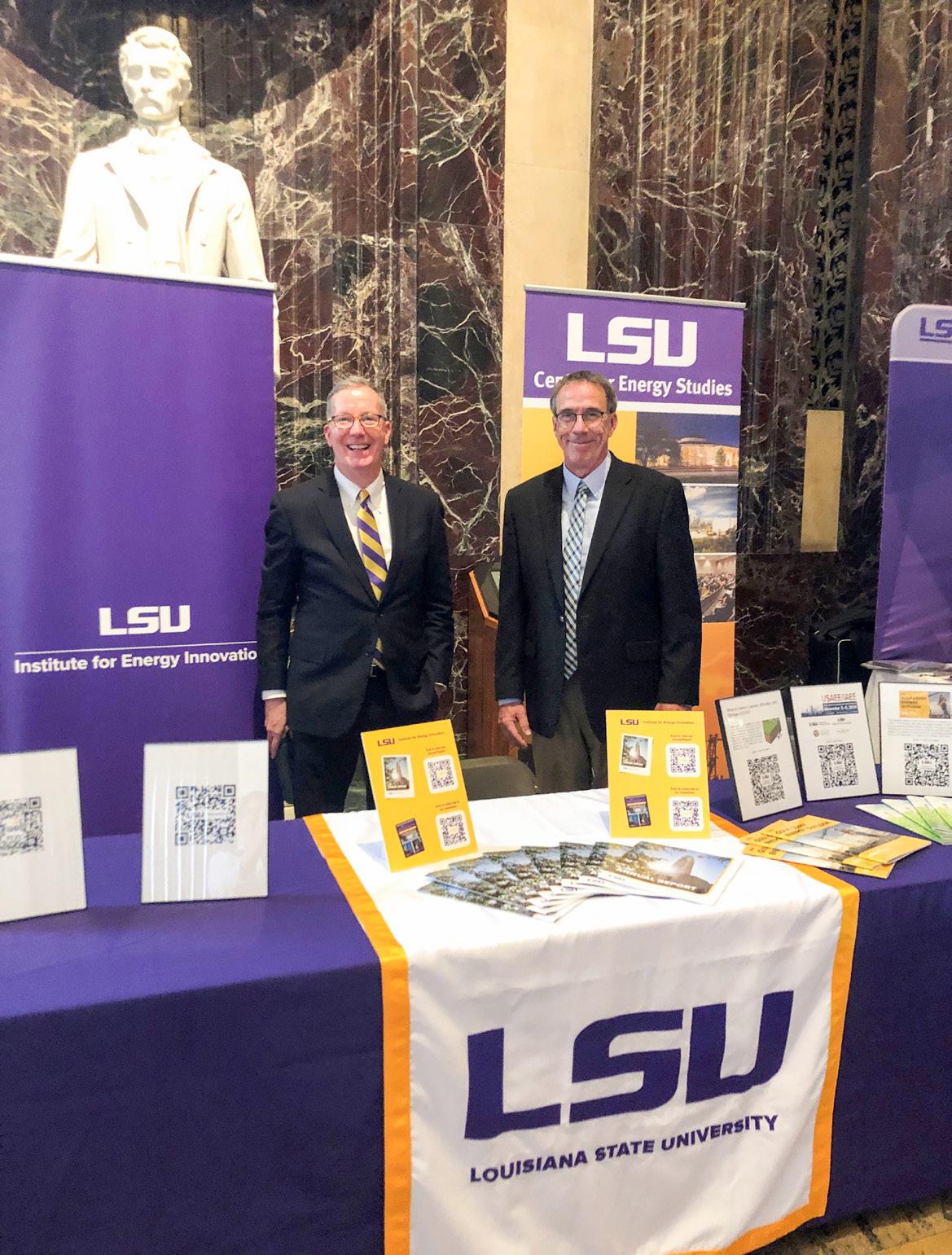
Groundbreaking for the new LSU
Lab took place in November.
The Institute launched an exciting monthly webinar series in 2024 to inform stakeholders and the public of ongoing research efforts. Each webinar spotlights a researcher in a live broadcast, allowing them to share the details of their work, the progress they are making, the potential impact of their projects, and an interactive Q&A session with listeners.
The series kicked off in July with Dr. Frank Tsai, who discussed “Assessing CO2 Geologic Storage Impacts on Louisiana’s Water Resources and Environment.” Dr. Tsai, Chevron professor of Engineering and Director of the Louisiana Water Resources Institute, spoke on the impact of carbon capture and storage in the Lake Maurepas area of Louisiana, including: geological complexity of Lake Maurepas; CO2 migration patterns; baseline CO2 levels; and ground movement monitoring.
In November, Dr. Aly M. Aly was featured in a webinar that focused on “Resilient Coastal Communities: Sustainable Strategies for Solar Energy and Windstorm Preparedness.”
Dr. Aly spoke about his cutting-edge research, which focuses on enhancing the resilience of solar panels in coastal regions prone to windstorms. Dr. Aly is Associate Professor of Civil and Environmental Engineering at LSU and Founding Director of the WISE Research Lab.
And in December, Dr. Jyotsna Sharma explored cutting edge advancements in carbon monitoring technology through her project “Development and Field Demonstration of Distributed Fiber-Optic Carbon Sensor for Long-Term Monitoring of Storage Sites.” She discussed how the project combined theoretical modeling with experimental validation to enhance the sensor’s sensitivity and selectivity, addressing critical environmental conditions such as humidity and temperature. Attendees learned about the innovative approaches applied in sensor development and the upcoming testing phases, including trials conducted in LSU’s flow loop and wellbore facilities under various operating conditions.
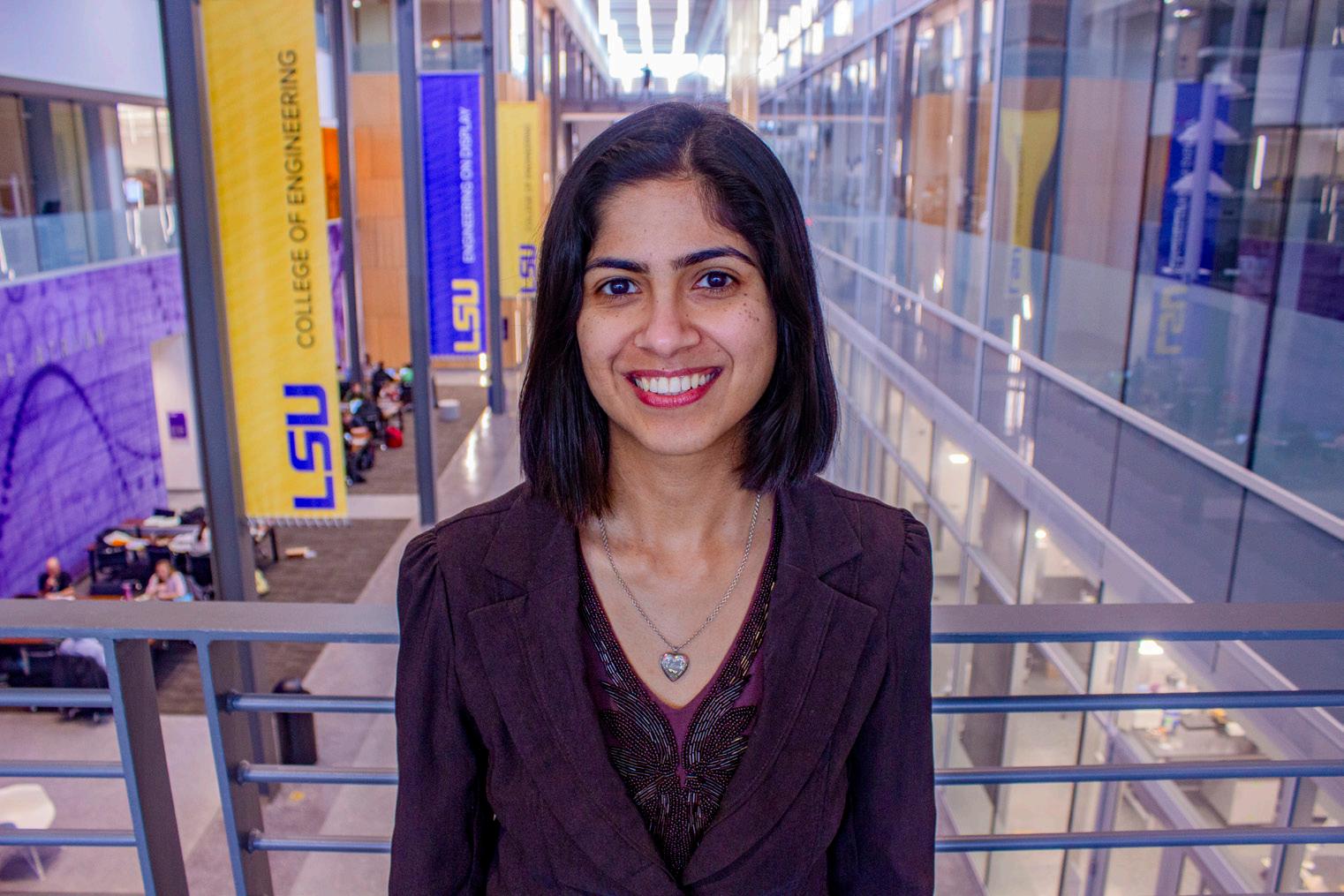



THE LSU INSTITUTE for Energy Innovation strives to match existing academic skill sets, technologies and expertise with the current needs of the energy industry. With the assistance of Institute grants, LSU and Southern University researchers tackle complex energy challenges from multifaceted perspectives, including engineering, chemistry, physics, biology, environmental science, geology, coastal science, economics, public administration, mass communication, policy analysis, business, law and more.
They delve deeply into the intricacies of energy systems, exploring not only the technical aspects but also the economic, social, and environmental dimensions of energy production, distribution and consumption.
The Institute conducts energy innovation workshops—three have been conducted to date—that connect industry, LSU researchers and representatives of non-governmental organizations in order to match current needs with capabilities. After each of these workshops, faculty members from LSU and Southern University participate in a symposium to build cross-disciplinary teams to support their respective research goals and then submit proposals to the Institute for grant consideration.
To facilitate the research proposal process, the Institute has created six broad focus areas, as follows:

CARBON CAPTURE, UTILIZATION, AND STORAGE (CCS) & HYDROGEN
Carbon sequestration will be a principal means of achieving net-zero goals for both electricity generation and production of process heat for industrial applications. For power generation, CCS is rapidly becoming a key technological need as wind and solar will not meet the needs of expected future demand. Likewise, the use of hydrogen for power generation and thermal applications, while promising, is on a slower path to adoption than CCS. As a result, CCS will be a key focus for the Institute in the near future while hydrogen continues to be an important secondary priority.
Current LSU Institute for Energy Innovation funded research related to this sector:
• Developing an AI-Driven Digital Well Log Database for Sustainable CCS and Hydrogen Storage
• Identification of Underground Hydrogen Storage Sites in Louisiana: Assessing Geographical, Geological, Infrastructural, and Environmental Factors
• Treatment Approaches to Mitigate Emissions from Amine-Based Carbon Capture, Reducing Risks
• An Exploratory Investigation into the Market Viability of Applying Numerical Models as a Tool for Natural-Based Carbon Sequestration
• Fee Structures for Landowners, State, and Parishes Associated with Carbon Injection
• Artificial Intelligence-Driven Selection of Safe Carbon Injection Sites in Louisiana
• Development and Field Demonstration of Distributed Fiber-Optic Carbon Sensor for Long-Term Monitoring of Storage Sites
• Assessing Carbon Geological Storage Impacts on Louisiana’s Water Resources and Environment
• Pressure/Temperature Monitoring to Track Subsurface Carbon Flow and Well Sealing Capacity in GCS Projects
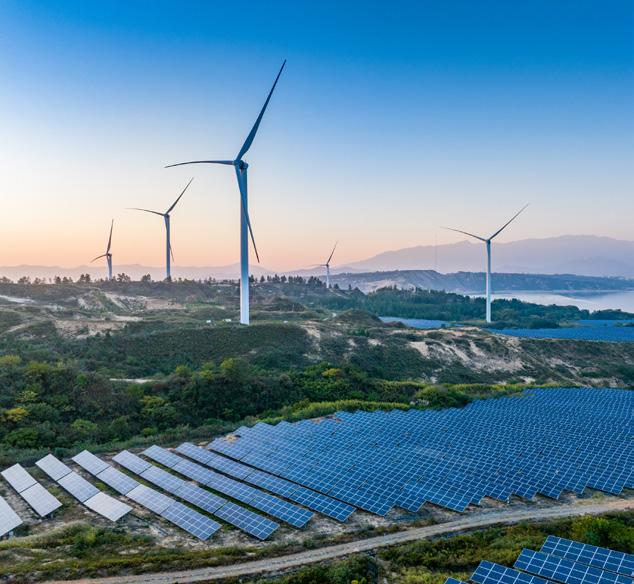
Louisiana is currently second in the nation in greenhouse gas emissions, per capita, and second in gross emissions. Therefore, increasing the energy efficiency of industrial sites will be a key focus of the Institute, as industries seek to achieve net zero greenhouse gas strategies. Research will, in part, determine how owners can benefit from the sale of carbon credits.
Current Institute for Energy Innovation funded research related to the sector:
• An Exploratory Investigation into the Market Viability of Applying Numerical Models as an MRV tool for Natural-Based Carbon Sequestration
Researchers are investigating optimal uses for recycled feedstocks versus virgin feedstocks to produce lower energy intensities and environmentally responsible products. Initial research will, in part, focus on advanced recycling processes. In the low-carbon fuels area, researchers are looking at new feedstocks like biomass or captured carbon dioxide.
Current Institute for Energy Innovation LSU IEI funded research related to this sector:
• Sustainable Aviation/Maritime Fuels from Biomass Residues in Louisiana
(Community Benefit Planning, Community Engagement, Environmental Justice, Workforce Development, Workforce Transition and Job Creation)

Institute researchers are finding optimal ways for companies to partner with the communities in which they’re located to improve the quality of life and economic well-being of those communities. The Institute is dedicated to ensuring that all Louisianans—especially historic workers in the oil and gas industry and people that not shared in energy-related opportunities in the past—can benefit from the job opportunities and related economic opportunities created by industrial development in and around the energy sector.
Current Institute for Energy Innovation funded research related to this sector:
• Resilience and Equity in Smart Community-Utility Energy Planning
• Experimental Analysis of Floating Photovoltaic (FPV) Systems in Industrial Wastewater Treatment Ponds for Louisiana Community Resiliency
• Utility Scale Solar in Louisiana: Mapping Research, Policy and Justice Landscape
• Advancing Solar Deployment for Louisiana Communities: Optimal Design and Windstorm Mitigation for Enhanced Performance, Durability, and Cost Reduction
As temperatures increase, storms intensify and sea levels rise, researchers are finding ways that the state, industry and citizens of Louisiana can continue to function successfully and enjoy a high quality of life. Principally, they are investigating various methods for adapting to the changing environment, such as through improved power grid resilience, storm-resistant offshore wind technologies and resilient solar power systems.
Current Institute for Energy Innovation funded research related to this sector:
• Resilience and Equity in Smart Community-Utility Energy Planning
• Optimal Design and Windstorm Mitigation for Enhanced Performance, Durability, and Cost Reduction
• Developing Hurricane Resilient Offshore Wind Technology for Gulf of Mexico
• Wind-Resilient and Equitable Agrivoltaic Systems

ZERO-EMISSION ELECTRICITY (Solar, Wind, Geothermal, Nuclear, & Biomass Power Generation, Storage, and Grid Management)
The Institute places significant attention on solar development and is a leading entity for south Louisiana’s offshore wind tech hub (Brad Ives is the tech hub’s regional innovation officer). Researchers are also working jointly with LSU’s Center for Energy Studies in the development of a workforce study for the geothermal industry and are developing methods for carbon sequestration in the biomass industry.
Current Institute for Energy Innovation funded research related to this sector:
• Utilizing the Sun for a Sustainable Future in Louisiana
• Digital Twins for Agrivoltaic and Floating Solar Farms to Support Design Exploration, Deployment, and Multi- Objective Optimization for Setting Best Practices

“Energy represents a central driver of Louisiana’s economy, and Louisiana buttresses the nation’s energy supply, putting LSU in the unique position to partner with industry to discover innovative methods to fuel our nation. We invite fellow industry leaders to join us in pioneering the research and development pathways forward to protect and preserve Louisiana’s energy economy, while meeting the nation’s future energy needs.”
William F. Tate IV LSU President
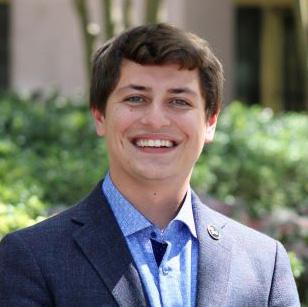
“The State of Louisiana has an unprecedented opportunity to usher in the future of energy through innovative research and collaborations. LSU’s Institute for Energy Innovation is a central component of realizing this potential, and an initiative GNO, Inc. has been proud to partner with over the last year.”
Cameron
Poole
Energy
& Innovation Manager GNO, Inc.
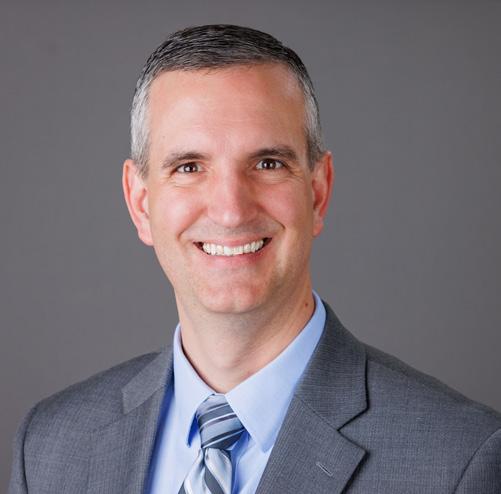
“ExxonMobil is committed to meeting the world’s energy needs and bringing low carbon solutions to consumers around the world. LSU’s Institute for Energy Innovation and their focus on talent, research and policy supports a thriving energy economy for Louisiana and beyond.”
Jason Pettrey Technical Manager, Baton Rouge Complex, ExxonMobil Product Solutions

“The LSU Institute for Energy Innovation (IEI) is driving vital research to transform the energy landscape in Louisiana and beyond. Partnering with industry and academia, IEI is advancing research in areas such as Carbon Capture and Storage (CCS) and low carbon fuels. Together, we aim to continue enhancing the economic, environmental, and social benefits for our local communities. We look forward to continuing this important work.”
Shell USA, Inc.

In October, the LSU Institute for Energy Innovation and the Baton Rouge Area Chamber hosted Andrew P. Jones, Executive Director and Co-Founder of Climate Interactive and a Research Affiliate at the MIT Sloan School of Management, for a special lunch event with the Baton Rouge Carbon Reduction Alliance to demonstrate how the En-ROADS Simulator is used by global decision-makers to shape national and international climate policies like the Inflation Reduction Act. Jones and his team at Climate Interactive and MIT Sloan have developed the En-ROADS Simulator, a powerful climate solutions model used widely to engage global decision-makers. Users can visualize future scenarios by testing the impacts of various climate actions, including electrifying transportation, reducing methane emissions, implementing carbon removal technologies, and more. En-ROADS has over 800,000 users in 130 countries and is available in 20 languages.
$160 million
In January, a statewide effort led by LSU with more than 50 public and private partners won the largest and most competitive grant ever awarded by the U.S. National Science Foundation (NSF)—up to $160 million over the next 10 years. Louisiana’s team, called Future Use of Energy in Louisiana, or FUEL, includes private energy companies, universities, community and technical colleges, and state agencies that will work together to position the state to lead the global energy expansion, driving technology, creating jobs, and supporting workforce development.
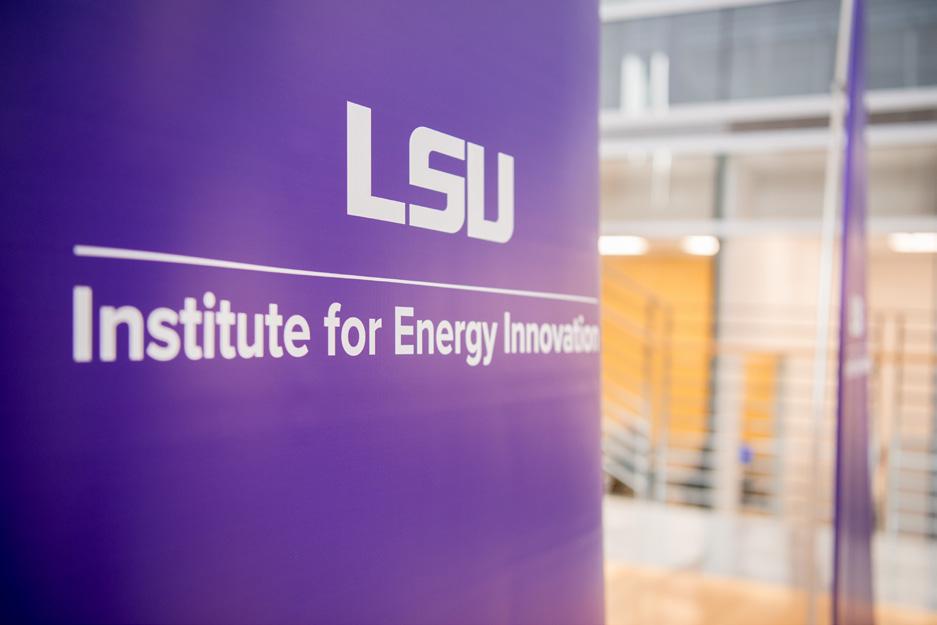
Don’t miss out on the latest research, events and expert analysis provided by the LSU Institute for Energy Innovation. The department is comprised of a passionate community of people who work to advance environmentally responsible energy in Louisiana for the world. Scan the QR code on the back cover of this publication to subscribe to our newsletter, and visit our website for valuable news.

The LSU College of Engineering and its Craft & Hawkins Department of Petroleum Engineering hosted a “spudding” ceremony on November 8 for the new CO2 Research Well at the LSU PERTT – Petroleum Engineering Research, Training, and Testing Lab on LSU’s campus. The event served as a ceremonial groundbreaking for the well, which was designed in collaboration with Halliburton and ExxonMobil. This new, one-of-its-kind well enables students, researchers, regulators, and industry to study CO2 in all three of its phases under realistic field conditions. It does not inject any CO2 into the subsurface, and is solely used for research purposes. The LSU PERTT Lab is located at 2829 Gourrier Dr. in Baton Rouge.
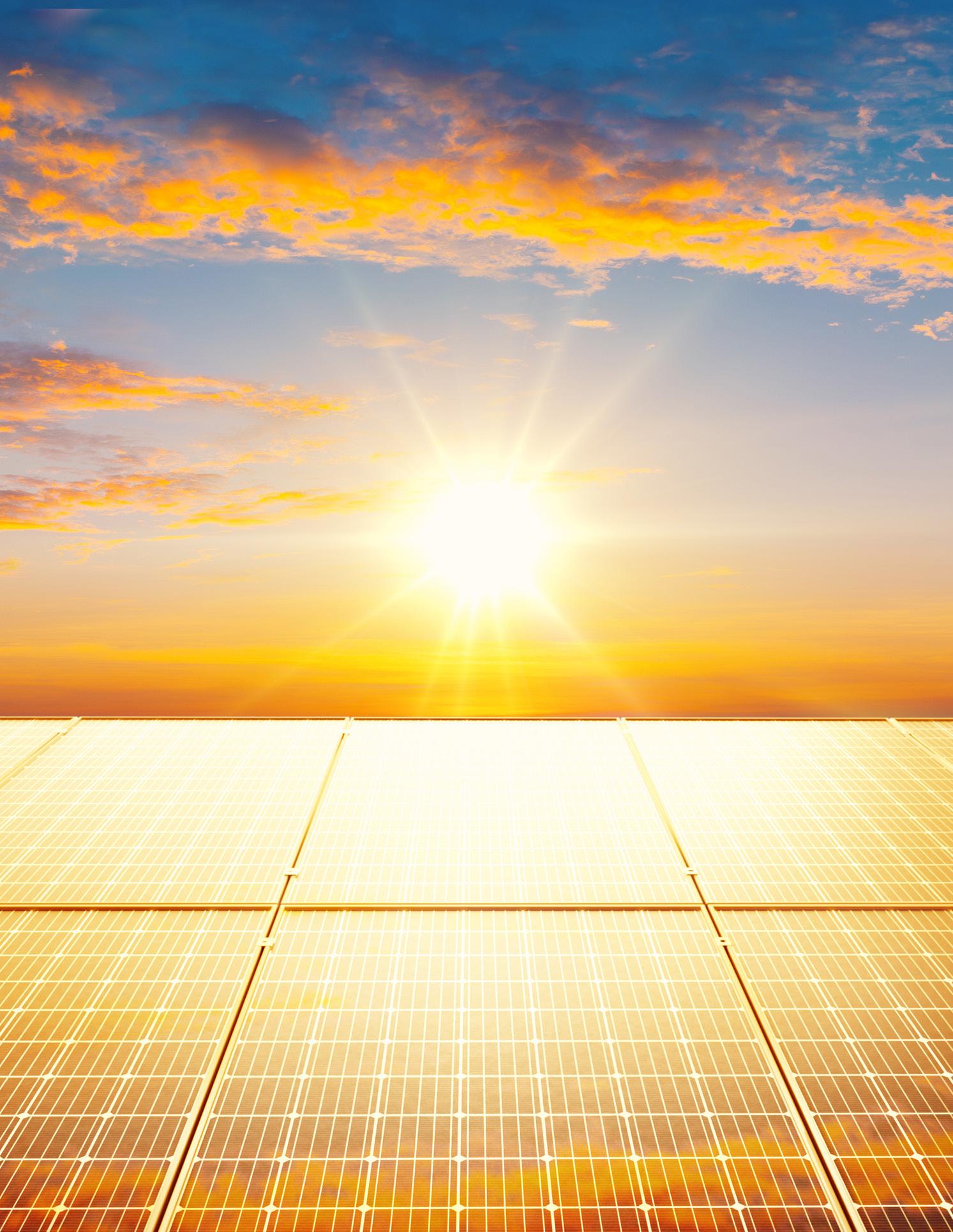
In its third year, LSU Institute for Energy Innovation will focus on the future with an expanded research portfolio and more partnership opportunities.

The LSU Institute for Energy Innovation remains committed to fostering innovation through a full funding cycle for technical, scientific, engineering, and policy research. Round III and Round IV Requests for Proposals (RFPs) are scheduled for the spring and fall of 2025, with funding announcements planned for April and September.
The Institute’s goal is to ensure a series of impactful projects. To support this process, the Institute will host energy innovation workshops and faculty symposiums each semester that bring together industry leaders and LSU faculty to inspire new ideas and create collaborative teams prepared to address emerging energy challenges.
The Institute’s Speaker Series, held each spring and fall semester, started in October 2024 and will continue with Tom Morris, a philosopher, in February 2025. The program will feature prominent speakers addressing critical topics ranging from how climate modeling can influence policy decisions to how human philosophy can impact our ability to work together to embrace change.
By inviting high-profile speakers from industry, government, nonprofit organizations, the press, and academia, the series aims to inspire students, enhance classroom learning, and foster public dialogue about our energy challenges. Through public talks, keynote addresses, and classroom discussions, the Speaker Series will serve as a platform for innovative thinking and will broaden the Institute’s reach across multiple audiences.
The Institute is partnering with LSU’s Center for Energy Studies (CES) to support energy education and outreach initiatives, which are being led by Chris McLindon, CES’s Director of Energy Education & Outreach. Through this partnership, the Institute covers part of McLindon’s salary, ensuring that his expertise is fully utilized to develop and expand educational projects that advance the Institute’s mission of promoting innovative energy solutions and awareness.
The Institute and CES also will be working closely with the National Science Foundation-backed Future Use of Energy in Louisiana (FUEL) in 2025 to develop education and outreach programs that support the missions of all three entities by generating interest in STEM education and showcasing Louisiana’s exciting role in the future of energy.
Louisiana is seeing a surge in announcements of energy-related projects ranging from solar farms to biofuels plants to carbon capture and sequestration projects. All of these activities have impacts on the communities where they will be located. The Institute is building a Local Outreach Working Group that has a dedicated team of researchers that are experts in different aspects of working with communities to make them stronger by addressing their challenges and helping them make the most of transformative opportunities.
The Institute is developing a community well-being assessment tool to help companies and communities identify areas for improvement. This tool will be coupled with another tool for identifying the key groups that need to be engaged in developing
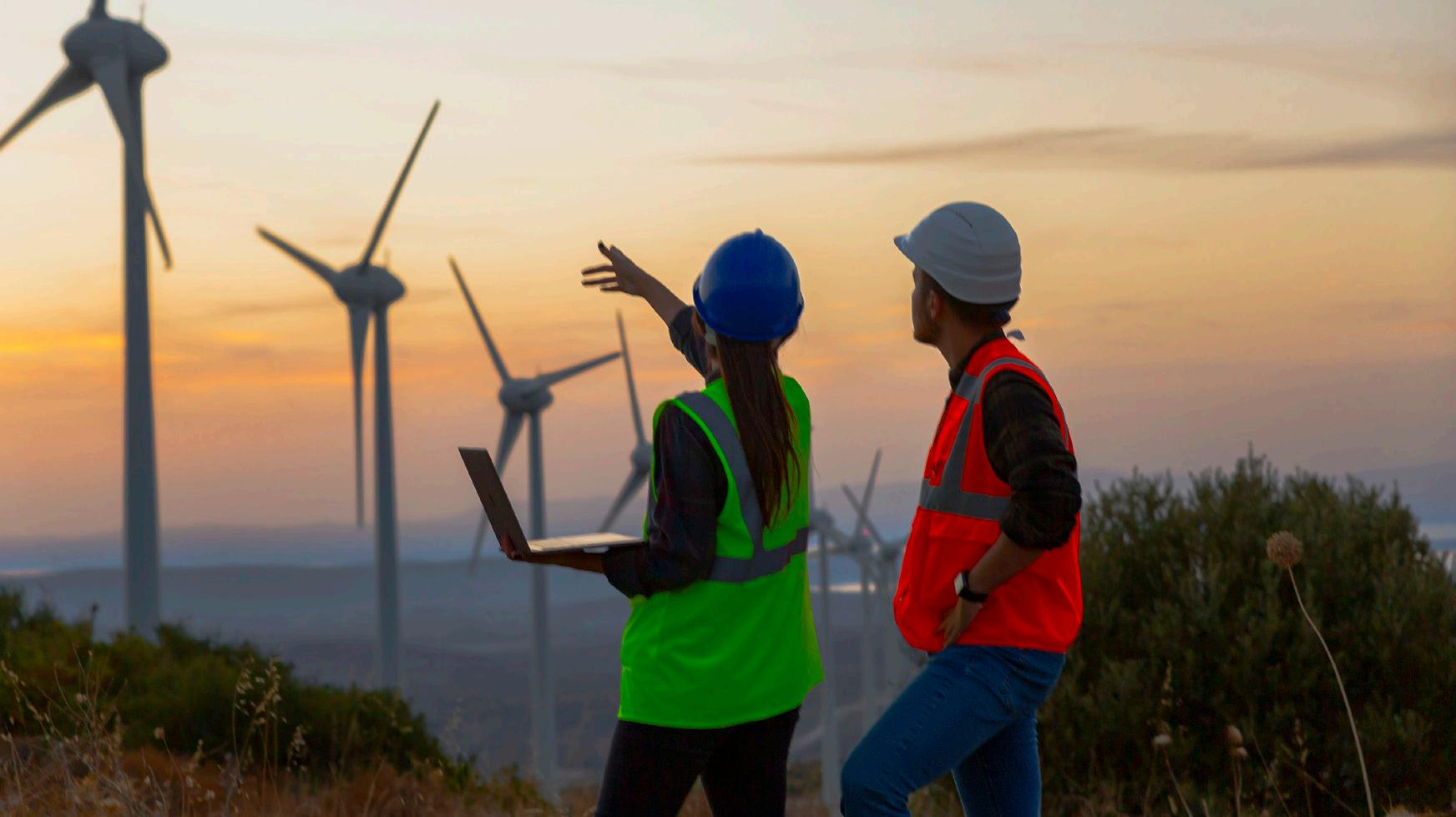
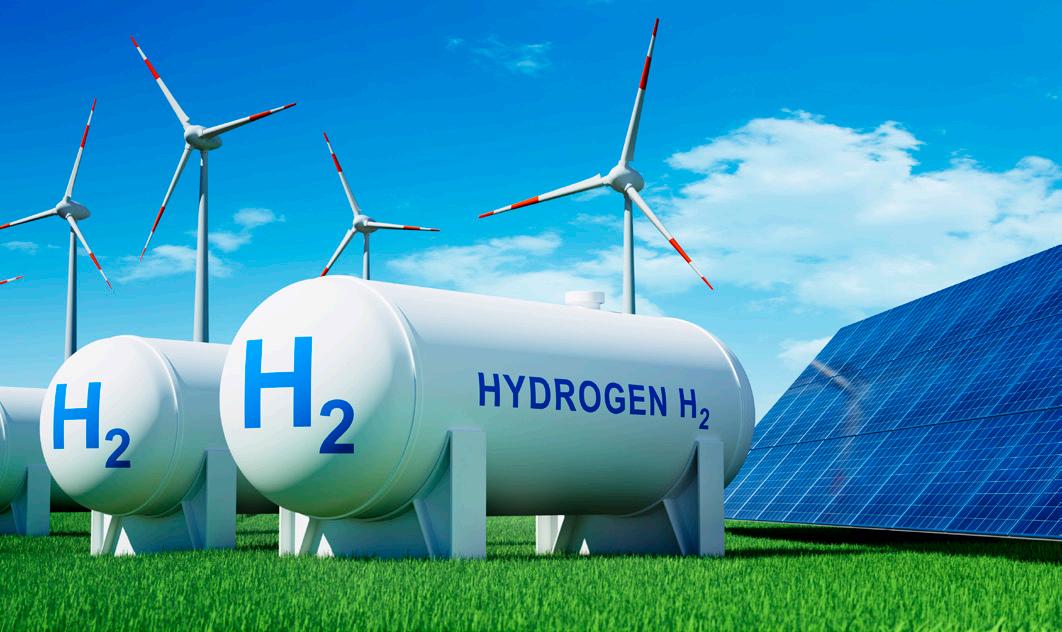
an improvement plan as well as a catalog of best practices that have worked to address the identified concerns. Through this work, the Institute can help ensure that all communities in Louisiana benefit from the energy-related investments that are being made in the state.
The Institute works closely with LSU’s Office of Research and Economic Development to provide leadership on energy issues across the university. As noted above, the Institute collaborates with the LSU Center for Energy Studies and the FUEL program on education and outreach. The Institute, CES, and FUEL meet on a regular basis to optimize the impact of all three organizations on the energy transition in Louisiana.
As an entity created by the Louisiana Legislature, CES remains the primary contact for state and local governments that need information and data on energy-related matters. As a federally-funded initiative, FUEL has a broad statewide mandate and focuses on job creation and entrepreneurship in the state’s energy industry. The Institute supports both of these efforts while also funding on-campus research, working with industry to identify needs that can be met by LSU, and acting as an entry point for energy at the university.
During the coming year, the LSU Institute for Energy Innovation will be establishing fellowship programs that are designed to develop future leaders and advance cutting-edge research in energy-related fields. This program will offer fellowships for undergraduates, graduate students, post-doctoral researchers, LSU faculty, and external experts to provide opportunities for professional development and exchange of ideas. Fellows will participate in research, outreach, and leadership activities, contributing to key areas such as energy transitions, carbon capture, renewables, and environmental justice. By bridging academic knowledge, industry needs, and policy expertise, the Institute’s fellowship program ensures a steady pipeline of talent and innovation to address the energy challenges of today and the future.
Executive Director Brad Ives would like to create greater engagement with both the LSU campus and communities throughout the state by hosting special speakers and making more outreach efforts. In partnership with LSU’s Center for Energy Studies, says Ives, “We want to provide information to communities across Louisiana to help them understand the new energy projects coming to the state. What are the benefits and risks? What tools can we provide to help them properly evaluate these projects? How can they increase their tax base and jobs? And how can they do that in a way that doesn’t damage the environment?”


